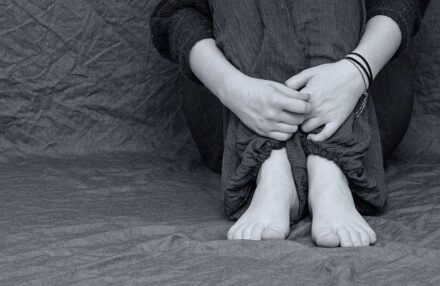I’m afraid of….
…spiders? Closeness? Failure? Saying no? the dark? being alone? illness?
As you can see, fear has a thousand faces. And everyone, without exception, is familiar with it.
To put it somewhat dryly, fear is an increased arousal in your nervous system (see also the last blog) and an attempt to protect yourself. In most cases, however, there is no enemy on the outside that you need to protect yourself from – it’s all in your head.
Here are a few facts and then, of course, tips on what you can do.
- Fear is always future-oriented. We imagine, fantasize and invent all the bad things that could happen. Understanding this is a key to dealing with anxiety.
- Anxiety mobilizes a lot of energy in your body, mainly triggered by noradrenaline and adrenaline. They make your hands sweat, your pulse race, your bronchial tubes widen and your attention become more focused, etc. Very soon, cortisol is added to this (you know this from the blog about stress) and the stress response is complete.
- Anxiety is often hidden under anger or sadness. “I’m so angry that my girlfriend has stood me up again!” or “I’m so sad, on the verge of tears, that she’s dumped me again”. Hidden underneath this could be, for example, the fear of not being important enough or not valuable enough. I’m not saying that the anger or sadness is inadequate, just that it’s not yet the root. Have a look at how it is for you!
- The primal fear of all of us is to die! That would have happened quite easily as a baby. We are the only species that is collectively born prematurely. We can’t move or feed ourselves for a long time without the help of others – AND compared to most animals, we need emotional care to survive. What am I trying to say? Being alone, not being heard, was life-threatening as a baby. So was being unimportant. Unfortunately, when we experienced emotional or physical violence, contact with people was also threatening. So on the one hand, it’s logical that fear is so virulent and on the other, it’s logical that we try so damn hard to be good, lovable, well-adjusted, liked and successful.
Before we look at what women can do, I would like to start by saying that there are many different ways of dealing with anxiety. Depending on the situation and the type of anxiety, something different is required. Sometimes two techniques are totally contradictory – but each one is worth its weight in gold at the right moment. Here are a few tips:
- Stop brooding! Brooding is a drug that doesn’t work. We do it because it gives us a sense of control and activates reward mode in the brain. Like an addiction, we want more of it and worry even more – which of course doesn’t make the anxiety any better. Yoga teaches us that we are not our thoughts. There is an infinite freedom to realize that the chatter in the upper mind is just that – chatter in the upper mind, and nothing more.
- Instead: get up, shake yourself, move around, work up a sweat and take the focus away from yourself. In default mode, where the brain is in fear, everything revolves around you. Get out of there! Here is a nice text by Jack Kornfield:
“You can either give in to your fear and anxiety, or you can take this time to train yourself in steadiness, trust, the ability to have a broader perspective, and perhaps more than anything, to develop your sense of care and connection for everyone else.
Put your fears and anxieties aside and tell them: Thank you for trying to protect me, but I’m okay for now.
Every day, pause, put your hand on your heart, and tell yourself: Let me hold all of what I’m worried about with a tender compassion. Let me hold myself, my worries, my family, and my friends. May they all be safe. May we all hold ourselves with tenderness and compassion.”
- See if you can manage to simply be with the fear. Not fight it, but hold it like a little bird in your open hand. Breathe and accept that it is there at the moment. And: like all, all, all emotions, it will go away – if you just let it! Only if you stage your horror scenarios over and over again on your mental stage, then of course it will stay. So don’t brood!
Would you like to receive my newsletter once a month with more exercises? Sign up here!


